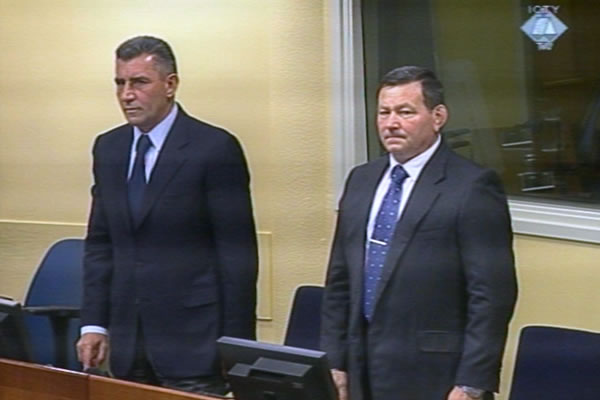Home
KEY ISSUES DEFINED FOR APPELLATE HEARING IN OPERATION STORM CASE
The Appeals Chamber presented to the parties four key issues they should deal with at the appellate hearing scheduled for 14 May 2012. The issues refer to the Trial Chamber’s finding that the artillery attack launched by the Croatian Army on Krajina towns was unlawful and that, as such, it constituted an element of the joint criminal enterprise aimed at expelling Serbs from Krajina
 Ante Gotovina and Mladen Markac in the courtroom
Ante Gotovina and Mladen Markac in the courtroom Three weeks before the appellate hearing in the case of Croatian generals Ante Gotovina and Mladen Markac, Judge Meron and his Appeals Chamber presented to the parties a list of issues the parties should deal with in their oral arguments. The appellate hearing will take place on 14 May 2012 and will take the whole day.
In the order published today, the sides were asked to focus in their oral arguments on the topics dealt with in the briefs filed by Gotovina and Markac. The parties were also cautioned against presenting new arguments. The prosecution and the defense were invited to consider four issues related to the Trial Chamber’s finding about the unlawful artillery attacks on Knin and other Krajina towns as one of the elements of the joint criminal enterprise aimed at expelling Serbs from Krajina during and after Operation Storm in the summer of 1995.
The first issue the parties should consider is whether the Trial Chamber erred in “applying a 200 meter range of error in analyzing the lawfulness of artillery shelling”. Secondly, the parties should consider whether the conclusions regarding the shell impacts in civilian areas could be upheld if the application of the legitimate 200 m range of error from military targets is found to be erroneous. If the conclusions on impact sites are quashed, the Appeals Chamber has the third question: whether the findings on the unlawful artillery attacks may be upheld. Finally, if the Appeals Chamber quashed the finding about the unlawfulness of the artillery attacks, the parties should consider if the Trial Chamber’s finding that the existence of a joint criminal enterprise aimed at expelling Serbs from Krajina should be reversed.
All of these issues are related to the key arguments listed in Gotovina’s appellate brief. Gotovina’s defense stated that the entire judgment was based on an ‘arbitrary’ conclusion that all shells that fell more than 200 meters away from military targets were illegal. If the Appeal Chamber quashes this conclusion, the Trial Chamber’s judgment ‘cannot be upheld’, Gotovina’s defense argued. Gotovina was convicted because he ordered an unlawful artillery attack which was the ‘main and direct cause’ of the Serbs’ exodus from Krajina. The conclusion that Gotovina participated in the joint criminal enterprise was also based on this finding. The Trial Chamber listed in its judgment other elements of the joint criminal enterprise, such as plans to expel Serbs made at the Brijuni meeting, the looting and burning of Serbs’ houses and preventing the refugees from returning to their homes.
In April 2011, Ante Gotovina, former Split Military District commander, was sentenced to 24 years in prison. Mladen Markac, who commanded the special police, received an 18-year sentence. Ivan Cermak, the Knin Garrison commander, was acquitted on all counts. Gotovina and Markac filed appeals against the judgment; the prosecution didn’t appeal.
Linked Reports
- Case : Gotovina et al. - "Operation Storm"
- 2012-04-20 GOTOVINA AND MARKAC TO RETURN TO COURT SOON AFTER THEIR APPELLATE HEARING
- 2012-04-05 GOTOVINA AND MARKAC WILL FACE APPEALS CHAMBER ON 14 MAY
- 2012-02-14 ‘AMICUS CURIAE’ BRIEF IN THE CASE OF CROATIAN GENERALS DENIED
- 2012-05-14 GOTOVINA’S DEFENSE DENIES UNLAWFUL ATTACKS ON CIVILIANS
- 2012-05-14 MARKAC’S DEFENSE BRINGS DOWN ‘HOUSE OF CARDS’
- 2012-07-20 MODES OF LIABILITY FOR GOTOVINA AND MARKAC
